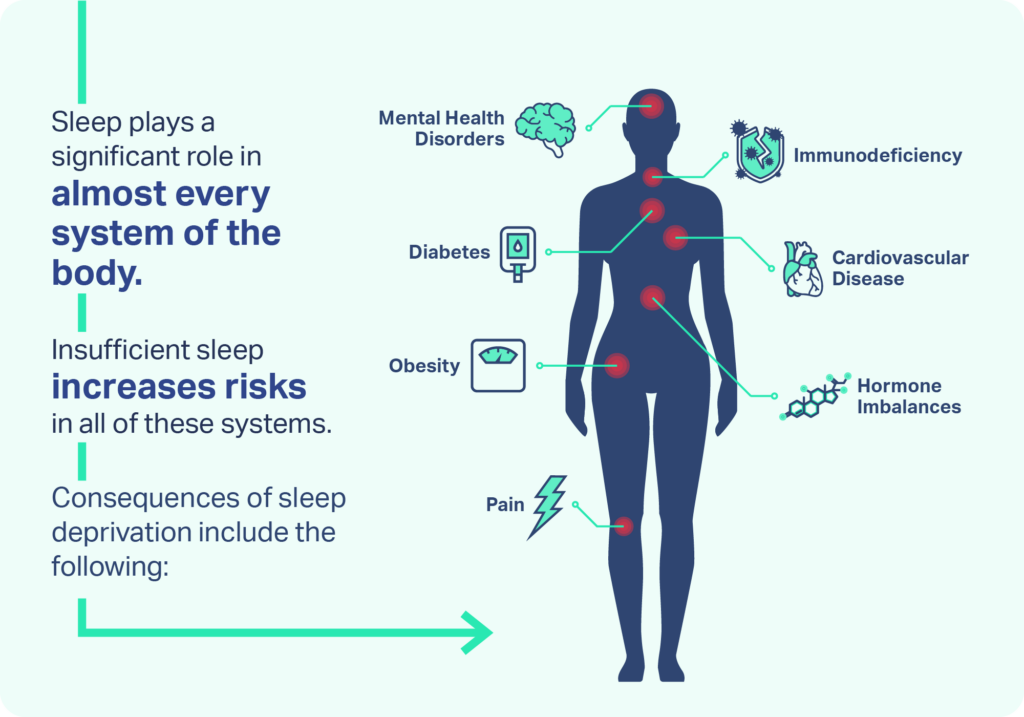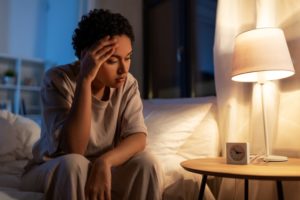When you buy through our links, we may earn a commission. Products or services may be offered by an affiliated entity. Learn more.
Effects of Sleep Deprivation
Sleep deprivation happens when a person does not get the sleep they need to sustain their health and well-being. It is common for people to sacrifice sleep for work, school, or fun, but even one night of inadequate sleep can leave people feeling tired, less productive, and more prone to mistakes the next day.
Nearly half of people in the U.S. have trouble sleeping, and around one-third of adults sleep less than seven hours each night. Without enough sleep, the body begins to accumulate sleep debt.
As sleep debt grows over time, it begins to take a toll on mental and physical health. Long-term sleep deprivation can reduce quality of life and may increase the risk of health issues including obesity, diabetes, and cardiovascular disease.
Learn more about the impacts of sleep deprivation, including its causes, and how prioritizing sleep hygiene can help people get the rest they need.
Looking to improve your sleep? Try upgrading your mattress.
What Are the Effects of Sleep Deprivation?
Research has found that sleep deprivation affects systems throughout the body, leading to a wide range of negative effects.
- Daytime sleepiness: Not getting enough sleep is a common cause of people feeling tired during the day . Daytime sleepiness can leave a person without the energy to do the things they enjoy and cause problems at work, school, and in relationships.
- Impaired mental function: One of the most noticeable effects of sleep loss is cognitive impairment. As sleep debt grows , a person becomes less alert and may have difficulty multitasking. Reductions in attention make a sleep-deprived person more prone to mistakes, increasing the risk of a workplace or motor vehicle accident.
- Mood changes: Sleep loss can lead to mood changes and make a person feel more anxious or depressed. Without enough sleep, people may feel irritable, frustrated, and unmotivated. They may also struggle to deal with change and to regulate their emotions.
- Reduced immune function: Sleep is important for maintaining a healthy immune system, so sleep deprivation can weaken immune function. In fact, research suggests that people who are sleep deprived are less responsive to the flu vaccine and are more likely to get infections like the common cold.
- Weight gain: Sleep is important for maintaining a healthy weight . Not getting enough sleep can affect appetite and metabolism in ways that can lead to weight gain. Insufficient sleep has been associated with an increased risk of obesity.
Sleep deprivation can have a drastic effect on the ability to safely drive a car. Not only does sleep loss reduce a person’s ability to pay attention and react quickly, it can also lead to microsleeps, which involve unknowingly falling asleep for a brief moment. Drowsy driving is linked to tens of thousands of injuries and hundreds of deaths in the U.S. each year.

When sleep loss becomes a regular occurrence, chronic sleep deprivation can lead to changes in the nervous system, contribute to long-term health complications, and exacerbate chronic medical conditions.
- Diabetes: A lack of sleep can make it more difficult for the body to process sugar, contributing to glucose intolerance and increasing the risk of type 2 diabetes.
- Heart disease: During normal sleep, blood pressure drops in ways that are believed to support heart health. Sleep deprivation prevents this drop in blood pressure and triggers inflammation, heightening the risk of cardiovascular diseases, such as heart disease and stroke.
- Mental health conditions: Sleep deprivation is closely linked to mental health . Sleep loss may increase the risk of mental health issues, and those issues can make it harder to get enough sleep.
How Much Sleep Is Enough?
Experts have created guidelines for the amount of sleep needed to maintain optimal mental health, physical health, and emotional well-being. Without this amount of sleep, people begin to accumulate sleep debt and experience the consequences of sleep deprivation.
| Age Group | Age Range | Recommended hours of sleep per 24 hours |
|---|---|---|
| Infant | 4-12 months | 12-16 hours (including naps) |
| Toddler | 1-2 years | 11-14 hours (including naps) |
| Preschool | 3-5 years | 10-13 hours (including naps) |
| School-age | 6-12 years | 9-12 hours |
| Teen | 13-18 years | 8-10 hours |
| Adult | 18 years and older | 7 hours or more |
Sleep needs vary across the lifespan but also from person to person. This means that how much sleep an individual needs depends on more than just their age. For example, some people may be naturally long or naturally short sleepers who require more or less than the recommended number of hours to wake up feeling rested.
How much sleep a person needs also depends on their health and typical daily activities. In the short-term, the need for sleep is temporarily increased after demanding activities, when a person is sick, or when recovering from a period of sleep deprivation.
Additionally, avoiding sleep deprivation is about more than just spending enough hours in bed. Healthy and restorative rest also depends on the quality of sleep. So even if a person gets the right amount of hours of sleep, they may still be sleep deprived if their sleep quality is reduced from waking up too often at night.
Symptoms of Sleep Deprivation
The symptoms of sleep deprivation may be obvious or subtle depending on how much sleep is missed and how accustomed a person is to sleep deprivation. Signs to watch out for include:
- Waking up feeling unrefreshed
- Daytime sleepiness
- Falling asleep unexpectedly during the day
- Difficulty functioning at home, work, or school
- Trouble concentrating and slow reaction times
- Mood changes and problems controlling emotions
- Spending more than 30 minutes trying to fall asleep
- Feeling tiredness in the morning despite a full night of sleep
- Waking up frequently during the night
- Snoring loudly or gasping for air while sleeping
Some symptoms of sleep deprivation may look different in children than in adults. In addition to dozing off during the day, children with sleep deprivation may exhibit an increase in energy or hyperactivity. Children may also have frequent changes in mood, difficulty controlling their behavior, or poor academic achievement.
Causes of Sleep Deprivation
There are many potential causes of sleep deprivation, ranging from natural changes in the body as people age to an undiagnosed medical condition or sleep disorder.
In teens, sleep deprivation can develop because of changes during puberty that lead adolescents to prefer later bedtimes. This natural preference for late nights often conflicts with early morning school schedules, making it difficult for teens to get the sleep they need.
In women and people assigned female at birth, sleep loss can occur at certain times during their menstrual cycle. People commonly have fragmented sleep in the week before their period begins . Sleep loss is also common during and after pregnancy and during menopause.
Other causes of sleep deprivation include poor sleep habits, busy schedules, and health issues that interfere with getting enough quality rest.
- Poor sleep habits: Daytime habits can either help or hinder nighttime sleep. Sleep deprivation can be caused by poor sleep habits, such as using a cell phone, TV, or other electronics in bed, drinking caffeine too close to bedtime, or having an inconsistent sleep schedule.
- Full schedules: A common reason for losing sleep is a busy schedule that involves activities in the late evening. People who work late or overbook themselves in the evening may sacrifice sleep in hopes of sleeping in on the weekend. Unfortunately, extra sleep on the weekend is not able to fully compensate for lost sleep during the week.
- Stress: Stress is a natural reaction to challenging situations, but if left unchecked it can make it more difficult to fall asleep at night. Excess stress causes the body to release hormones that trigger alertness, which can interfere with normal sleep.
- Issues in the sleep environment: A person’s sleep environment can have a significant impact on their sleep. People who live in noisy areas may find it difficult to get quality sleep. Sleep can also be interrupted by too much ambient light and temperatures that are too hot or too cold.
- Medical conditions: Many medical problems can interfere with sleep, including pain, heart failure, and asthma. Some medical conditions may flare up or get worse at night, like acid reflux or chronic obstructive pulmonary disease (COPD).
- Medications and substances: A wide variety of medications can interrupt sleep or make it more challenging to doze off. These include certain steroids, decongestants, pain medications, and drugs used to treat anxiety and depression.
- Mental health conditions: Several mental health conditions are linked to sleep challenges, including depression, anxiety, and bipolar disorder, as well as attention deficit hyperactivity disorder (ADHD) , and autism spectrum disorder.
Another potential cause of sleep deprivation is an undiagnosed or untreated sleep disorder. In fact, as many as 70 million people in the U.S. live with a chronic sleep disorder. Sleep disorders that can make it difficult to get enough sleep include insomnia, obstructive sleep apnea, and restless legs syndrome.
Treatment for Sleep Deprivation
Treatment for sleep deprivation involves finding ways to get more hours of high-quality sleep. The best approach to achieving this depends on the cause of an individual’s sleep problems. In people with persistent sleep deprivation, it may take several weeks or longer to resolve the symptoms of sleep loss.
When symptoms of sleep loss continue despite an improvement in sleep habits, working with a doctor is an important step in addressing the causes of sleep problems. To help determine the cause of sleep deprivation, a doctor may ask questions related to routines and sleep habits, such as:
- What time do you go to bed and wake up each day, including on the weekends?
- What is your work schedule?
- Is sleep refreshing or is it difficult to get up in the morning?
- Do you wake up often during the night?
- How often do you take daytime naps?
- Does daytime sleepiness ever interfere with your life?
Using this information, a doctor may recommend additional tests to find the source of sleep issues. A doctor may suggest starting a sleep diary to keep track of symptoms and habits that may be causing sleep deprivation.
Preventing Sleep Issues
To reduce the risk of sleep deprivation, it is important to take steps to improve sleep hygiene.
- Make sleep a priority: Prioritize sleep health by creating a comfortable sleep environment and keeping a consistent sleep schedule. This means going to sleep and waking up at around the same time each day and avoiding the temptation to stay up later or sleep in on the weekends.
- Combat stress: To combat bedtime stress, give yourself plenty of time to wind down from the day. Use this time to listen to calming music, stretch, or write in a journal. Boost your ability to relieve stress by trying out new relaxation techniques and seeing what helps the most.
- Time your light exposure: Ambient light can signal to the body whether it is time to be awake or prepare for sleep, so be intentional about light exposure. Try to get at least 30 minutes of sunlight exposure during the day and then dim or turn off lights in the evening. Shut off phones, TVs, and computers at least an hour before bed.
- Watch your caffeine intake: Caffeine can linger in the body for eight or more hours, so consuming caffeine in the afternoon may affect how long it takes to doze off at bedtime.
- Nap wisely: Although they cannot replace quality nighttime rest, naps can be a helpful tool to improve daytime alertness. If naps are too long or poorly timed, though, they can make it more difficult to fall asleep in the evening. Adults should aim for naps that are no longer than 20 minutes and should avoid napping in the late afternoon.
- Stay active: Regular exercise can make it easier to get to sleep at bedtime. Try to get at least 30 minutes of physical activity every day, but it is best to avoid highly strenuous exercise too close to bedtime.
Medical Disclaimer: The content on this page should not be taken as medical advice or used as a recommendation for any specific treatment or medication. Always consult your doctor before taking a new medication or changing your current treatment.
References
13 Sources
-
Cirelli, C. (2022, October 10). Insufficient sleep: Definition, epidemiology, and adverse outcomes. In R. Benca (Ed.). UpToDate., Retrieved December 18, 2022, from
https://www.uptodate.com/contents/insufficient-sleep-definition-epidemiology-and-adverse-outcomes -
National Institute for Occupational Safety and Health. (2020, April 1). Sleep debt. Centers for Disease Control and Prevention., Retrieved December 18, 2022, from
https://www.cdc.gov/niosh/emres/longhourstraining/debt.html -
National Heart, Lung, and Blood Institute. (2011, August). Your guide to healthy sleep., Retrieved December 18, 2022, from
https://www.nhlbi.nih.gov/health-topics/all-publications-and-resources/your-guide-healthy-sleep -
National Heart, Lung, and Blood Institute. (n.d.). Sleep deprivation and deficiency., Retrieved December 18, 2022, from
https://www.nhlbi.nih.gov/health-topics/sleep-deprivation-and-deficiency -
National Highway Traffic Safety Administration. (n.d.). Drowsy Driving., Retrieved December 18, 2022, from
https://www.nhtsa.gov/risky-driving/drowsy-driving -
National Institute of Diabetes and Digestive and Kidney Diseases. (2021, March 17). The impact of poor sleep on type 2 diabetes., Retrieved December 18, 2022, from
https://www.niddk.nih.gov/health-information/professionals/diabetes-discoveries-practice/the-impact-of-poor-sleep-on-type-2-diabetes -
Scott, A. J., Webb, T. L., & Rowse, G. (2017). Does improving sleep lead to better mental health? A protocol for a meta-analytic review of randomized controlled trials. BMJ open, 7(9), e016873.
https://pubmed.ncbi.nlm.nih.gov/28928187/ -
Consensus Conference Panel, Watson, N. F., Badr, M. S., Belenky, G., Bliwise, D. L., Buxton, O. M., Buysse, D., Dinges, D. F., Gangwisch, J., Grandner, M. A., Kushida, C., Malhotra, R. K., Martin, J. L., Patel, S. R., Quan, S. F., Tasali, E., Non-Participating Observers, Twery, M., Croft, J. B., Maher, E., … Heald, J. L. (2015). Recommended amount of sleep for a healthy adult: A joint consensus statement of the American Academy of Sleep Medicine and Sleep Research Society. Journal of Clinical Sleep Medicine, 11(6), 591–592.
https://pubmed.ncbi.nlm.nih.gov/25979105/ -
Rajagopal, A., & Sigua, N. L. (2018). Women and sleep. American Journal of Respiratory and Critical Care Medicine, 197(11), P19–P20.
https://pubmed.ncbi.nlm.nih.gov/29856255/ -
A.D.A.M. Medical Encyclopedia. (2022, April 30). Stress and your health. MedlinePlus., Retrieved December 18, 2022, from
https://medlineplus.gov/ency/article/003211.htm -
Shah, P., & Krishnan, V. (2019). Hospitalization and sleep. American Journal of Respiratory and Critical Care Medicine, 199(10), P19–P20.
https://pubmed.ncbi.nlm.nih.gov/31090456/ -
Bandyopadhyay, A., & Sigua, N. L. (2019). What is sleep deprivation? American Journal of Respiratory and Critical Care Medicine, 199(6), P11–P12.
https://pubmed.ncbi.nlm.nih.gov/30874458/ -
Schwab, R. J. (2022, May). Insomnia and excessive daytime sleepiness (EDS). Merck Manual Professional Version., Retrieved December 18, 2022, from
https://www.merckmanuals.com/professional/neurologic-disorders/sleep-and-wakefulness-disorders/insomnia-and-excessive-daytime-sleepiness-eds












